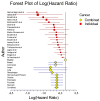Olive oil intake is inversely related to cancer prevalence: a systematic review and a meta-analysis of 13,800 patients and 23,340 controls in 19 observational studies
- PMID: 21801436
- PMCID: PMC3199852
- DOI: 10.1186/1476-511X-10-127
Olive oil intake is inversely related to cancer prevalence: a systematic review and a meta-analysis of 13,800 patients and 23,340 controls in 19 observational studies
Abstract
Dietary fat, both in terms of quantity and quality, has been implicated to cancer development, either positively or negatively. The aim of this work was to evaluate whether olive oil or monounsaturated fat intake was associated with the development of cancer. A systematic search of relevant studies, published in English, between 1990 and March 1, 2011, was performed through a computer-assisted literature tool (i.e., Pubmed). In total 38 studies were initially allocated; of them 19 case-control studies were finally studied (13800 cancer patients and 23340 controls were included). Random effects meta-analysis was applied in order to evaluate the research hypothesis. It was found that compared with the lowest, the highest category of olive oil consumption was associated with lower odds of having any type of cancer (log odds ratio = -0.41, 95%CI -0.53, -0.29, Cohran's Q = 47.52, p = 0.0002, I-sq = 62%); the latter was irrespective of the country of origin (Mediterranean or non-Mediterranean). Moreover, olive oil consumption was associated with lower odds of developing breast cancer (logOR = -0,45 95%CI -0.78 to -0.12), and a cancer of the digestive system (logOR = -0,36 95%CI -0.50 to -0.21), compared with the lowest intake. The strength and consistency of the findings states a hypothesis about the protective role of olive oil intake on cancer risk. However, it is still unclear whether olive oil's monounsaturated fatty acid content or its antioxidant components are responsible for its beneficial effects.
Figures
Similar articles
-
Selenium for preventing cancer.Cochrane Database Syst Rev. 2018 Jan 29;1(1):CD005195. doi: 10.1002/14651858.CD005195.pub4. Cochrane Database Syst Rev. 2018. PMID: 29376219 Free PMC article.
-
Ear drops for the removal of ear wax.Cochrane Database Syst Rev. 2018 Jul 25;7(7):CD012171. doi: 10.1002/14651858.CD012171.pub2. Cochrane Database Syst Rev. 2018. PMID: 30043448 Free PMC article.
-
Systemic pharmacological treatments for chronic plaque psoriasis: a network meta-analysis.Cochrane Database Syst Rev. 2021 Apr 19;4(4):CD011535. doi: 10.1002/14651858.CD011535.pub4. Cochrane Database Syst Rev. 2021. Update in: Cochrane Database Syst Rev. 2022 May 23;5:CD011535. doi: 10.1002/14651858.CD011535.pub5. PMID: 33871055 Free PMC article. Updated.
-
Home treatment for mental health problems: a systematic review.Health Technol Assess. 2001;5(15):1-139. doi: 10.3310/hta5150. Health Technol Assess. 2001. PMID: 11532236
-
A rapid and systematic review of the clinical effectiveness and cost-effectiveness of topotecan for ovarian cancer.Health Technol Assess. 2001;5(28):1-110. doi: 10.3310/hta5280. Health Technol Assess. 2001. PMID: 11701100
Cited by
-
The Role of Diet in Cancer Prevention and Chemotherapy Efficacy.Annu Rev Nutr. 2020 Sep 23;40:273-297. doi: 10.1146/annurev-nutr-013120-041149. Epub 2020 Jun 16. Annu Rev Nutr. 2020. PMID: 32543948 Free PMC article. Review.
-
(-)-Oleocanthal and (-)-oleocanthal-rich olive oils induce lysosomal membrane permeabilization in cancer cells.PLoS One. 2019 Aug 14;14(8):e0216024. doi: 10.1371/journal.pone.0216024. eCollection 2019. PLoS One. 2019. PMID: 31412041 Free PMC article.
-
Phenolic Compounds Isolated from Olive Oil as Nutraceutical Tools for the Prevention and Management of Cancer and Cardiovascular Diseases.Int J Mol Sci. 2018 Aug 6;19(8):2305. doi: 10.3390/ijms19082305. Int J Mol Sci. 2018. PMID: 30082650 Free PMC article. Review.
-
Virgin Olive Oil and Health: Summary of the III International Conference on Virgin Olive Oil and Health Consensus Report, JAEN (Spain) 2018.Nutrients. 2019 Sep 1;11(9):2039. doi: 10.3390/nu11092039. Nutrients. 2019. PMID: 31480506 Free PMC article. Review.
-
Meta-analysis of the association between dietary inflammatory index (DII) and upper aerodigestive tract cancer risk.Medicine (Baltimore). 2020 Apr;99(17):e19879. doi: 10.1097/MD.0000000000019879. Medicine (Baltimore). 2020. PMID: 32332658 Free PMC article.
References
-
- Perez-Jimenez F, Alvarez de Cienfuegos G, Badimon L, Barja G, Battino M, Blanco A, Bonanome A, Colomer R, Corella-Piquer D, Covas I, Chamorro-Quiros J, Escrich E, Gaforio JJ, Garcia Luna PP, Hidalgo L, Kafatos A, Kris-Etherton PM, Lairon D, Lamuela-Raventos R, Lopez-Miranda J, Lopez-Segura F, Martinez-Gonzalez MA, Mata P, Mataix J, Ordovas J, Osada J, Pacheco-Reyes R, Perucho M, Pineda-Priego M, Quiles JL, Ramirez-Tortosa MC, Ruiz-Gutierrez V, Sanchez-Rovira P, Solfrizzi V, Soriguer-Escofet F, de la Torre-Fornell R, Trichopoulos A, Villalba-Montoro JM, Villar-Ortiz JR, Visioli F. International conference on the healthy effect of virgin olive oil. Eur J Clin Invest. 2005;35:421–424. Review. - PubMed
-
- Kushi L, Giovanucci E. Dietary fat and cancer. Am J Clin Nutr. 2002;113:63–70. - PubMed
Publication types
MeSH terms
Substances
LinkOut - more resources
Full Text Sources
Medical


